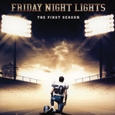In the heat of summer, when most people are busy with other things, one of the great television programs of the last several years draws to a close. That program is Friday Night Lights. Loved by critics and overlooked by viewers, the show presented a vivid depiction of family life, education, and the American dream over five seasons on NBC and DirecTV. The final episode has been in the can for a year, and the sets have long been struck. Most of the excellent cast has moved on to other projects, but the art they left behind lingers.
In some ways Friday Night Lights faced a fundamental obstacle from the beginning. Too many people believed the show was primarily about football, and dramas about sports have rarely produced compelling television. To some degree this misconception is understandable. Friday Night Lights began as a book by Buzz Bissinger about a real high school football program in Texas, and the book became a decent, if unmemorable, movie starring Billy Bob Thornton. I saw the movie in the theater and the main thing I remember is a blustery locker room speech by Thornton’s character to his team about the importance of protecting their town. I later spoke with a band director from the area who conveyed disgust at how that part of Texas was portrayed by Hollywood. As so often happens, the quest for a good story interfered with telling a true story.
The television series, which premiered on NBC in the fall of 2006, takes a softer approach. Football remains an obsession in the fictional town of Dillon, Texas, but many episodes do not contain even a single minute of game action. The real heart of this show is the remarkable marriage of Tami Taylor and her football coach husband, Eric. In a television landscape that too rarely depicts a complex, adult relationship, the Taylors have a partnership based on true love and shared values. This isn’t to say that the Taylors never fight. Their periodic arguments prove amusing and authentic. Other characters, including football players nervous about the big game and parents who have temporarily lost their way, make late night visits to the Taylor home for comfort and a word of advice.
Whether at school, on the field, or at home, Eric and Tami have an ongoing mission to help their students make better lives. Tami reminds her husband once, “You are a teacher first, and you are a molder of men.” Sometimes, the young men and women on the show make poor choices and need significant molding and guidance. Coach Taylor usually manages to find the right balance of tough talk and encouragement. When the first half of a crucial game goes terribly awry, Taylor’s locker room speech focuses not on the game, but the friends and family watching in the stands. He tells them “A few will never give up on you. When you go back on that field, those are the people I want in your minds. Those are the people I want in your hearts.” This gentle touch connects with the players and the viewers watching at home.
Over the course of five seasons, the writing and acting stayed at a consistently high level. Except for one glaring plot mistake in the second season (a season that was shortened by a television writers strike), I can think of few things I would have changed about the show. I am even willing to forgive that the marching band at Dillon appears only briefly during the series; the molding of student musicians apparently took place off screen. The viewers who stuck around for all five seasons are an unusual group. I have one female relative who watched all five seasons on DVD even though she would never spend a Sunday watching football. I urge those who skipped this show the first time to seek out those DVDs. You are in for a remarkable treat. As Coach Taylor once tells a reluctant potential player, “You love the game of football. You just don’t know it yet.”
James M. Rohner
Editor/Advertising Manager





